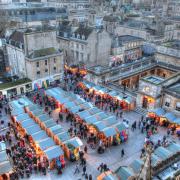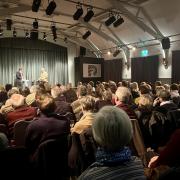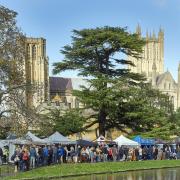It’s a hard job to know what to look at first upon entering Everett Fine Art studio.
WORDS: Rachel D’Cruze
The magpie in me is instantly drawn to the abundance of period gold gilt frames, which range from modest sizes to gargantuan proportions and where the condition varies from those waiting to be restored, and in many cases partially rebuilt, to those which have been restored to their former glory.
On the other side of the large studio, an oil painting from 1580, which is larger than the wall space in many modern homes, vies for my attention.
Everett Fine Art in Taunton specialises in the restoration of oil paintings, and has done for more than 50 years, which has seen the company undertake an extraordinary variety and complexity of work.
On oil paintings, where there has been damage, Tim Everett and his team are required to restore to exact standards and ‘retouch’ any missing areas of paint. There is often also the re-lining (conservation) of the original paintings onto a new backing canvas. Watercolours and paper conservation is another area the company specialises in, although it behaves very differently to canvas and demands different skills to restore.
Everett Fine Art is a second-generation family business, founded in 1956 by Edward Everett, father of Tim Everett, who now owns and runs the company.
Working alongside Tim in a full time capacity is Lester Gordon, who started making and repairing period frames for the London and American trade in 1981 and is now a master framer, specialising in carving, casting, gilding and high-quality finishes.
Brought in to work alongside Tim and Lester as needed are a range of other professionals, including a paper restorer and a wood carver.
Today Lester is working on an extremely detailed and ornate gold gilt frame, where he’s casting pieces to fit those that are missing.
It’s a process that requires an incredible about of patience and attention to detail.
“We are doing the whole framing process using the same method and products that we used 300 years ago. We’ve changed nothing: even our glue is made from the original all-natural recipe of bone, skin and starch boiled up,” explains Lester.
As well as restoring period frames – the oldest one they’ve done dates back to 1450 – the company makes new ones from scratch using wood and plaster, again adhering to traditional techniques.
The work carried out at Everett Fine Art is incredibly varied, as are the clients who range from private clients and country houses through to Bath Museum and the Somerset Marines and Commandos collection.
Tim shows me a small oil painting of someone’s mother they have lovingly restored and then we move on to talk about Kingsweston Collection, which is at the other end of the scale in which they work.
This collection represents a snap shot of 17th and 18th century painting from some of the most important artists of the day and best portrays the English tradition of fine portraiture.
Tim says that when the Grade 11 listed Georgian mansion, King Weston House, built in 1712, was purchased, the new owner decided to put the original art work back in, which had previously been stored in a collector’s garage.
Everett Fine Art undertook the restoration of the entire collection, which took 10 years to complete.
“The collection traces the family’s history for more than 200 years. As well as portraits of all the family members, there are those of their dogs, horses and other animals and that of the view over Avonmouth from the mansion, which shows how it’s changed – it was originally all countryside as far as you can see and now it’s a city view.”
When the mansion was sold again, the collection was re-homed in Cothelstone Manor, Bishops Lydeard, where it currently resides.
“In its entirety it embodies many of the typical challenges of conservation today. Whilst wishing to maintain the natural age or patina of the paintings and their beautiful gold leaf frames it has been important to safeguard each object for future generations,” says Tim talking about The Kingsweston collection, which Everett Fine Art now manages.
Managing collections represents a growing aspect of their work in conserving and advising on collections. This ranges from the managing, hanging and storing to the restoration and conservation of paintings and their frames.
Paintings will typically require restoration about every 100 years to conserve the paint stability.
Other than fire and flooding, age and alteration in humidity are the main causes of deterioration in paintings, which leads to pieces becoming weak, crumbling and flaking. “Modern central heating systems aren’t kind to pictures that have been used to a constant, often cool, temperature for years,” explains Tim. “The safest place for any collection is on the wall. As soon as you take art down it’s prone to scratching and being knocked,” adds Lester.
We ask Tim how long it typically takes to restore and conserve a single painting. “About two to three months, however, if it’s a particularly difficult and large piece, that timeframe can then go to up to a year and a half.
“Restoration and conservation work can’t be done on pictures or frames constantly as both have setting and drying times between stages of the processes,” he explains.
It’s certainly an interesting trade to be in and while there’s certainly a demand for the work of fine art restorers, the trade itself is in decline.
“It’s one of those careers you just trip over,” explains Tim.
Lester agrees, commenting that there were a lot more people with the same skillset as him when he started out more than 30 years ago but there are not now.
They tell me they’ve had students in their purpose built studio doing work placements recently and while they’ve been fascinated by what they do, most can’t get their heads around how long it takes to restore and conserve a piece of art back into its original state.
It’s a true trade – old fashioned and honest work that relies on skill and patience rather than machine and computer.
Lester sums it up well: “It’s a world away from modern jobs.” n
Everett Fine Art is situated at Heatherton Park Studios, Bradford on Tone, Taunton.



























